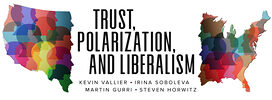Let me begin by thanking Steve, Martin, and Irina for commenting on my essay. Steve and Irina write mostly in agreement, though Irina is more pessimistic than I am. While I have grown more pessimistic about our ability to restore trust and reduce polarization since the events of 1/6, I wrote the essay in part to try to get classical liberals to join the fight to avert a grim future. We fought for freedom before when all seemed lost, and we can do so once more. And I agree with Steve and Irina that we should try decentralized and individualized solutions to the difficulties I discuss.
I’d like to focus, however, on Martin’s questions, since he challenged my arguments most directly. First, by a classical liberal, I mean someone for favors the market economic system and limited government, along with democratic governance, at least for instrumental reasons, and some kind of modest welfare state, at least in the short run. A classical liberal is also someone who favors the traditional liberal freedoms of speech, press, and religion. (Since I’m writing for Cato Unbound readers, I thought I could take the meaning of “classical liberalism” for granted.)
My essay was also written based on my arguments in my pair of recent books—Must Politics Be War? Restoring Our Trust in the Open Society (OUP 2019), and Trust in a Polarized Age (OUP 2020), the former focusing on the political philosophy of social trust, the latter approaching trust from other philosophical, political, and economic perspectives together. In the books, my goal is to identify the nature and sources of social trust and how a pluralistic society may seem to threaten social trust, but can in fact support it.
The central problem in both books is that, as our disagreements grow, we are increasingly tempted to attribute disagreements to what I call the illusion of culpable dissent. We often mistakenly blame others for disagreeing with us when we cannot understand their views. We cannot imagine affirming those views in good faith and in an informed way.
I think the illusion of culpable dissent is natural to us, and is exacerbated by high polarization, especially affective polarization, as well as low levels of social trust.
My fear, in both books, is that polarization and social trust are in a feedback loop, with polarization increasing distrust and vice versa. Elites are an understated part of the story, as they are the most polarized, and they are driving polarization and polarized distrust in most of the populace.
My solution is a form of classical liberalism—the protection of constitutional rights to freedom of association, private property, economic security, democratic governance, and elections. These rights can be justified to different reasonable points of view, giving each person moral reason to comply with them in the eyes of others. In this way, persons with diverse values can follow rules that allow us to trust one another despite our differences. Liberal rights motivate trustworthy behavior based on the right kinds of reasons, which motivates social trust under diverse conditions.
In Must Politics Be War?, I define a state of war as a society with low social trust in a wide array of central social norms. A state of moral peace occurs when we have high social trust in those norms. Low trust may not lead to violence, but not even Hobbes thought that the state of war occurs only when violence occurs. In my view, both Locke’s and Hobbes’s states of war (which don’t get as much play as their states of nature) can be characterized as a condition where different groups do not trust one another to follow basic norms of cooperation. When I discussed a war-like politics, I should have said that we are in a state-of-war-like politics, where our society is a kind of social tinderbox.
As noted, I stress in both books that what justifies trust is trustworthiness, and all of my institutional solutions are grounded in using liberal rights practices to encourage and display trustworthiness to others.
Martin and I agree on a great deal. I hope this little essay clarifies his questions and grants his wishes. I think Martin, Steve, Irina, and I are largely in agreement. A rare thing.

